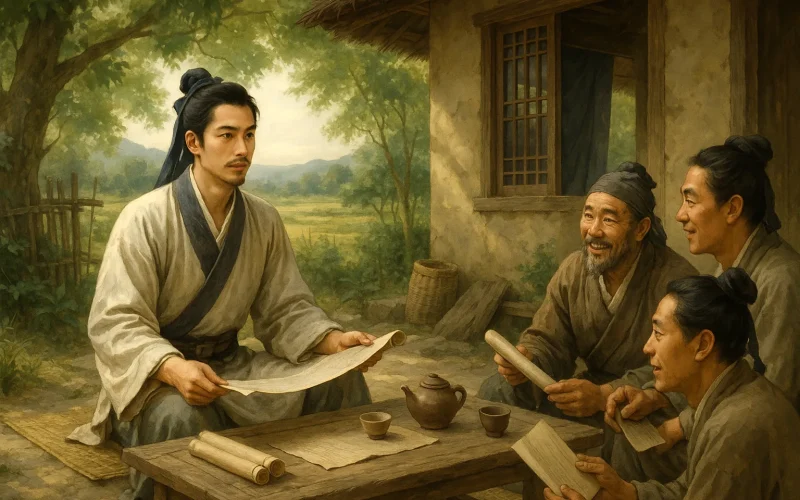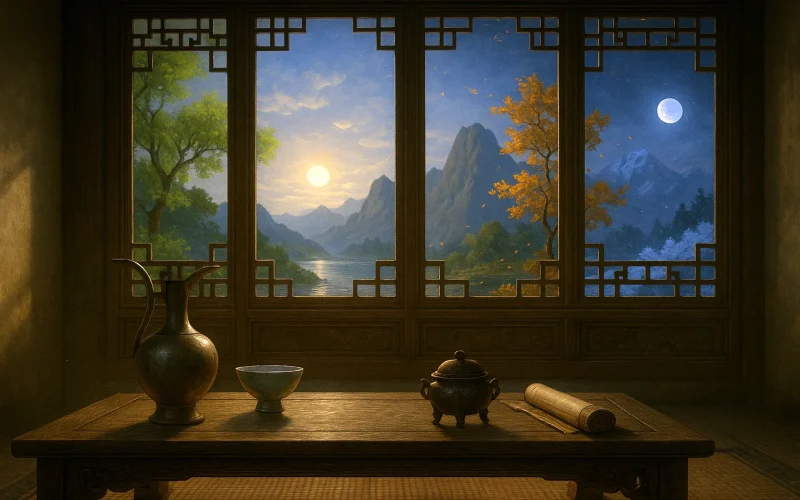Living in thatched cot down shabby lane,
I loved it more than house of golden frames.
A mid-summer blast blew with might and main,
My hut in the glade was swept by the flames.
My rooms were all burned up and lost to sight,
So in a boat I sought for shelter soon.
Long, long lasts the new autumn night,
Bright, bright shines the nearly full moon.
Again vegetables begin to grow,
But frightened birds won't come back here.
Far, far away my thoughts at midnight go,
When I gaze on the ninth celestial sphere.
While young, I loved to hold my own,
In that way I've passed forty years.
My body follows up and down,
My mind to independence steers.
It's pure and strong in its own way,
Like jade or stone which is fire-proof.
Looking up, I think of old day
With crops not stored under the roof.
People well-fed were carefree then.
They rose at dawn and slept at night.
Such golden age won't come again,
I would till my land if I might.
Original Poem
「戊申岁六月中遇火」
陶渊明
草庐寄穷巷,甘以辞华轩。
正夏长风急,林室顿烧燔。
一宅无遗宇,舫舟荫门前。
迢迢新秋夕,亭亭月将圆。
果菜始复生,惊鸟尚未还。
中宵伫遥念,一盼周九天。
总发抱孤介,奄出四十年。
形迹凭化往,灵府长独闲。
贞刚自有质,玉石乃非坚。
仰想东户时,余粮宿中田。
鼓腹无所思;朝起暮归眠。
既已不遇兹,且遂灌我园。
Interpretation
Composed in the summer-autumn of 408 AD when Tao Yuanming was 44 and residing in Shangjing (modern Jiujiang, Jiangxi), this poem responds to a catastrophic fire in mid-June that reduced his thatched cottage to ashes, leaving him temporarily sheltering in a boat moored before his property. Despite sudden adversity, the work radiates equanimity while offering profound reflection—demonstrating the poet's unwavering moral integrity and reclusive ideals even in distress.
First Couplet: "草庐寄穷巷,甘以辞华轩。"
Cǎo lú jì qióng xiàng, gān yǐ cí huá xuān.
"My thatched hut lodged in an obscure lane; / Gladly I renounced mansions of vain."
The opening establishes voluntary poverty as conscious choice rather than circumstance, framing reclusion as positive asceticism.
Second Couplet: "正夏长风急,林室顿烧燔。"
Zhèng xià cháng fēng jí, lín shì dùn shāo fán.
"Midsummer's fierce winds came roaring; / Woods and dwelling became blazing."
The disaster's suddenness ("became blazing") underscores life's impermanence without melodramatic lament.
Third Couplet: "一宅无遗宇,舫舟荫门前。"
Yī zhái wú yí yǔ, fǎng zhōu yīn mén qián.
"Not one roof-beam left standing; / Only my boat's shadow landing."
Matter-of-fact description of complete loss transforms the boat from transport to provisional home—an early example of "less is more" aesthetic.
Fourth Couplet: "迢迢新秋夕,亭亭月将圆。"
Tiáo tiáo xīn qiū xī, tíng tíng yuè jiāng yuán.
"Endless the new autumn night; / The poised moon swells toward light."
Celestial imagery ("poised moon") introduces cosmic perspective, dwarfing earthly misfortunes.
Fifth Couplet: "果菜始复生,惊鸟尚未还。"
Guǒ cài shǐ fù shēng, jīng niǎo shàng wèi huán.
"Fruits and greens tentatively sprout; / Frightened birds still flit about."
Nature's gradual recovery ("tentatively sprout") mirrors psychological healing process.
Sixth Couplet: "中宵伫遥念,一盼周九天。"
Zhōng xiāo zhù yáo niàn, yī pàn zhōu jiǔ tiān.
"Midnight finds me gazing far— / One glance spans heaven's ninefold star."
The astronomical "ninefold heaven" measurement elevates personal loss to philosophical meditation.
Seventh Couplet: "总发抱孤介,奄出四十年。"
Zǒng fà bào gū jiè, yǎn chū sì shí nián.
"Since childhood embracing solitary creed; / Forty years have passed with speed."
"Solitary creed" (孤介) crystallizes Tao's lifelong nonconformist stance beyond mere career choice.
Eighth Couplet: "形迹凭化往,灵府长独闲。"
Xíng jī píng huà wǎng, líng fǔ cháng dú xián.
"My body follows nature's course; / My mind keeps its own still source."
The body-mind dichotomy asserts spiritual autonomy despite physical vulnerability.
Ninth Couplet: "贞刚自有质,玉石乃非坚。"
Zhēn gāng zì yǒu zhì, yù shí nǎi fēi jiān.
"True fortitude comes from within; / Jade's hardness is but surface skin."
The jade metaphor subverts conventional values—prizing inner virtue over outward splendor.
Tenth Couplet: "仰想东户时,余粮宿中田。"
Yǎng xiǎng dōng hù shí, yú liáng sù zhōng tián.
"I recall eastern gate's old days— / Surplus grains, field-sheltered ways."
Nostalgia for simpler poverty ("surplus grains") highlights current extremity.
Eleventh Couplet: "鼓腹无所思,朝起暮归眠。"
Gǔ fù wú suǒ sī, zhāo qǐ mù guī mián.
"Belly-full without a care; / Dawn to dusk in work and prayer."
The pastoral ideal ("belly-full without a care") contrasts present dislocation.
Twelfth Couplet: "既已不遇兹,且遂灌我园。"
Jì yǐ bù yù zī, qiě suì guàn wǒ yuán.
"Since such peace eludes me now, / I'll tend my garden anyhow."
The closing gardening image transforms survival into spiritual practice—the quintessential Tao Yuanming resolution.
Holistic Appreciation
The poem's architectural brilliance lies in its seismic shift from literal ashes to philosophical rebirth. Moving through disaster documentation, cosmic perspective, moral retrospection, and final resolution, it demonstrates how material loss can catalyze spiritual clarification. Tao's "solitary creed" remains unshaken precisely because it was never dependent on external stability—the garden he tends is ultimately the field of his convictions.
Artistic Merits
The poem’s language is understated yet resonant, its restrained emotion baring genuine depth. Structurally, it moves from tangible reality to spiritual contemplation and historical reflection, then circles back to the present—a masterful symmetry of beginning and end. In its imagery, fire’s devastation, moonlit nights, pastoral fields, and fleeting birds intertwine, grounding the verse in nature while elevating it to symbolism. Lines like "Since childhood embracing solitary creed" and "My body follows nature’s course" distill profound insight into human fate and the inner self—each phrase honed to crystalline precision.
Insights
Tao's response to homelessness models how to anchor identity beyond material possessions. His "garden" represents not just physical sustenance but the cultivation of inner values when external worlds burn down—a paradigm for maintaining integrity in modern crises. The poem ultimately suggests that true shelter exists in one's unchanging principles rather than perishable dwellings.
Poem translator
Xu Yuanchong (许渊冲)
About the poet

Tao Yuanming(陶渊明), 365 – 427 CE, was a poet, literary figure, fu writer, and essayist active during the late Eastern Jin and early Liu Song dynasties. Born in Chaisang (near present-day Jiujiang, Jiangxi Province), he pioneered a new genre of pastoral-themed literature, expressing profound philosophical insights through simple language. His poetic style became an enduring aesthetic standard in classical Chinese poetry.











